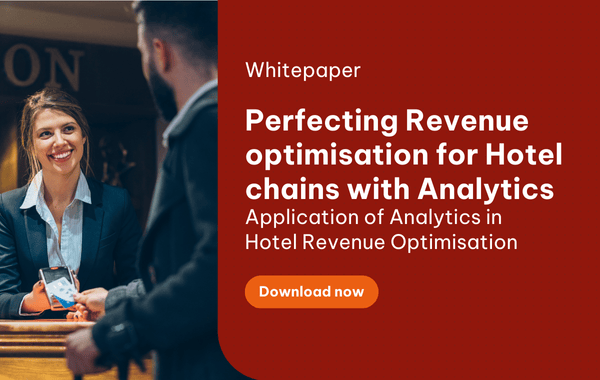The global hospitality industry has been observing strong signs of recovery heading into 2024, with demand rebounding to pre-pandemic levels. With travel on the rise once more, hoteliers must strategise effectively to capitalise on this revival period through proactive alignment with emerging trends.
With such an optimistic uptake on the market, there will be plenty of opportunities as well as emerging challenges awaiting. What trends should hospitality businesses, specifically hotels, keep an eye on in 2024?
Let's explore with today's article.
Content
Key hospitality trends to watch in 2024
II. Digital transforming the industry
5. Cloud-based property management
III. Sustainability takes centre stage
What do these trends mean for hoteliers?

Hospitality market overview
Skyscanner's recent study1 reveals that demand has returned to its familiar pre-pandemic patterns. The study also indicates an even more positive outlook in EMEA, AMER, and APAC, as travellers from these regions are booking even further ahead compared to this time last year.
Read more: What Are the Effects of Global Inflation on the Hospitality Industry?
Another testament to the strong bounce back is the industry's remarkable compounded growth rate of 7% in 2023, increasing to $4,699.57 from $4,390.59 billion in 20222.
The projected growth of the global hospitality market is set to soar to a staggering $5,816.66 billion by 2027, with a remarkable compound annual growth rate (CAGR) of 5.5%2.
Both STR, a leading hospitality analytics firm under CoStar, and SiteMinder, an Asutralian-based hotel tech company, are anticipating a surge in global room demand as travellers gear up for future vacations3.
Siteminder's projections also indicate a 4.9% growth in hotel average daily rates (ADR) over the next 12 months4.
These strong numbers point to brighter prospects for hotel operators and other players in the industry.
Key hospitality trends to watch in 2024
As the industry enters a new phase of recovery, several trends are expected to shape strategies and operations over the coming year. Here are some areas hoteliers need to pay attention to:
I. Workforce empowerment
Perhaps the biggest challenge over the past two years was not customer attraction but staff retention.
To address the challenge of staff shortages, numerous hotel groups have implemented solutions such as offering complimentary or affordable accommodation options5. In addition to providing flexible benefits, they have focused on developing more robust career progression opportunities that empower staff to advance with ease.
How else can staff be empowered? For each hotel member to provide exceptional experiences that result in repeat visits, they must have access to relevant and up-to-date insights about guests at all times, which can be done with appropriate data solutions capable of streamlining and automating their daily tasks.
Read more: Strategically Retain and Develop Your High-Potential Employees
II. Digital transforming the industry
Digital transformation has played a crucial role in reshaping the hospitality industry in recent years. With a wide array of technological solutions now considered standard practice, from mobile check-in/check-out to AI-powered customer service and data analytics, the digital revolution has become an integral part of daily operations.
This transformation is not just necessary; it allows hotels to create seamless and tailored travel experiences for each guest in today's era of hyper-personalisation.
TRG International predicts that the following solutions will receive more attention this year.
1. Revenue management
According to Duetto, 82.3% of hoteliers were now using a revenue management system (RMS), up from 67.6% in its 2022 survey6.
The role of revenue management within the industry is unquestionable. With the rapid adoption of digital solutions, there is now an abundance of revenue management tools available to hoteliers, enabling them to develop, refine, and implement revenue management strategies with a few simple clicks.
While an RMS can enhance revenue optimisation by setting prices, forecasting demand, and managing inventory, its true potential lies in its integration with a property management platform.
Not only can it help hoteliers reduce manual workload, but the RMS and PMS integration also helps improve the accuracy of real-time pricing recommendations and enhance guest experience.
With the continuous and extensive embrace of cloud-based software in 2024, the transition of both RMS and PMS solutions to the cloud is inevitable.
2. Generative AI
Artificial intelligence (AI) was the talk of the town in 2023, dominating headlines and sparking discussions across various industries.
In hospitality, AI has already revolutionised the guest experience by driving various enhancements. Chatbots and virtual assistants, powered by constantly evolving Generative AI models, are now more sophisticated and efficient at handling complex guest inquiries in significantly shorter timeframes.
AI technology can also be integrated into a wide range of other solutions, such as analytics to enhance decision-making processes, enabling hoteliers to optimise room pricing, proactively identify maintenance issues before they escalate, and replace guesswork with data-driven insights for more informed decision-making within the industry.
Businesses can anticipate a surge in AI adoption and updates in 2024.
Read more: 3 Ways A.I. is Providing Personalised Experience to Hotel Guests
3. Open APIs
As the hospitality industry evolves and embraces innovative technologies, the seamless integration of systems has become a top priority. Application Programming Interfaces (APIs) serve as the essential link between different software platforms. It acts as the bridge that enables smooth communication between disparate components through a defined set of protocols and standards.
In today's dynamic digital landscape, APIs play a crucial role in streamlining operations within a property, fostering collaboration, and allowing teams to efficiently monitor daily activities from a unified interface with ease.
In fact, APIs have become a vital element across all facets of the hospitality industry, empowering hoteliers to establish a connected and innovative ecosystem.
This includes seamlessly integrating PMS with various platforms, such as restaurant and spa booking systems, revenue management, channel management, and more. Additionally, APIs facilitate connectivity with online booking platforms like Expedia for managing listings, rates, and bookings, as well as linking with messaging apps, social media platforms, guest review sites, and beyond.
They are the linchpin of the modern hospitality technology stack.
4. Data analytics
At the end of the day, what businesses worldwide generate the most is an abundance of data. Effectively harnessing this wealth of data requires specialised analytics tools to extract valuable insights and seamlessly integrate them into relevant software or departments for further processing.
From recommending room upgrades based on past stays to offering customised dining options, data analytics enable hoteliers to anticipate and exceed guest expectations.
Moreover, modern, robust data analytics also allows for analysing and highlighting patterns in guest behaviours, enabling hoteliers to optimise pricing strategies, maximise revenue, and drive profitability.
Adopting data analytics is now imperative for hotels aiming to excel in a progressively digital and data-driven environment.
Read more: How Data Analytics is Changing Hotel Revenue Management
5. Cloud-based property management
The cloud-based property management software sector is witnessing substantial expansion. This, combined with the surge in augmented reality (AR) and virtual reality (VR) technology adoption in hospitality, represents a significant shift towards immersive guest experiences and operational efficiencies.
From virtual walk-throughs of hotel rooms and amenities to immersive virtual tours of local attractions and nearby landmarks, these technologies elevate the guest experience to new heights.
However, seamless integration of AR and VR into the hotel's PMS is only one of the many different ways hoteliers can leverage technologies to elevate the guest experience and increase the bottom line.
Why does going cloud-based make total sense? With traditional, legacy PMS, the hotel bears all the costs from implementation to maintenance and updates. With the cloud SaaS model, businesses pay for what they use on a subscription basis, making it more cost-effective and flexible for scaling up or down and expanding into new territories without the need for specific hardware or costly customisation.
Today, SaaS is the default software delivery model for even the most complex business systems, and businesses large and small across all industries, including hospitality, have embraced it.
Read more: Fundamentals of Cloud | Public v Private, SaaS v Hosted, Multitenancy
III. Sustainability takes centre stage
Sustainability has become a top priority for both consumers and businesses in recent years. Today’s travellers, restaurant patrons, hotel bookers, and shoppers want to know that the companies they give their business to follow environmentally, socially, and culturally sound practices.
A study by Nielson revealed that nearly 75% of younger generation respondents are actively supporting sustainable practices and are willing to take action. Interestingly, 51% of baby boomers are also willing to invest more in sustainable products and services7.
Hotels that proactively implement impactful green initiatives focusing on waste reduction, energy efficiency, and sustainable design are not only meeting the demands of conscious consumers but also setting themselves apart in a crowded market.
However, simply labelling a hotel as "going green" is not enough. What is truly required are meticulously crafted plans that include stakeholders, partners, and suppliers who share the same mindset and are committed to embracing the common goal of sustainability.
What do these trends mean for hoteliers?
After surviving the unprecedented challenges of the past few years, the hospitality sector is well-positioned for profitable growth ahead, riding on strong fundamentals. While macroeconomic uncertainties remain, the indicators point to immense recovery opportunities for forward-thinking hoteliers.
Adopting the key trends around talent, tech, and sustainability will prove pivotal for those optimistic about 2024 and beyond.
However, bear in mind that the empowered and technologically adept workforce of the future requires supportive leadership development. Revenue management, analytics, and AI can optimise performance but demand agile systems integrated via open APIs.
Moreover, responding to the sustainability imperative necessitates strategic capital investments and operations overhauls.
Nevertheless, now is an auspicious time for hospitality businesses globally to reset, rethink, and reignite operations with a visionary mindset.
For a global hotel chain, managing revenue across thousands of properties presents a formidable challenge. Thanks to the advancements in modern data analytics and Business Intelligence solutions, hotel chains have made significant strides in revenue optimisation.
In our comprehensive whitepaper, we explore the importance of adopting analytics software for enhancing revenue management in the hospitality industry. Don't miss out on the opportunity to elevate your revenue strategies – download the whitepaper today!
Sources:
1. https://www.partners.skyscanner.net/news-case-studies/horizons-regional-outlook-2024
2. https://www.reportlinker.com/p06193682/Hospitality-Global-Market-Report.html?utm_source=GNW
3. https://www.costar.com/article/489795461/hotel-daily-room-demand-headed-for-all-time-high-in-2023
4. https://www.siteminder.com/r/hotel-industry-statistics/#:~:text=The%20travel%20industry%20is%20set,in%20the%20next%2012%20months
5. https://hospitalityinsights.ehl.edu/luxury-hotels-staff-care
6. https://www.hotel-online.com/press_releases/release/duetto-reports-increased-adoption-of-revenue-technology/
7. https://www.ucf.edu/online/hospitality/news/sustainability-in-hospitality-why-it-is-important-and-how-industry-leaders-can-help/
 English
English  Vietnamese
Vietnamese 



